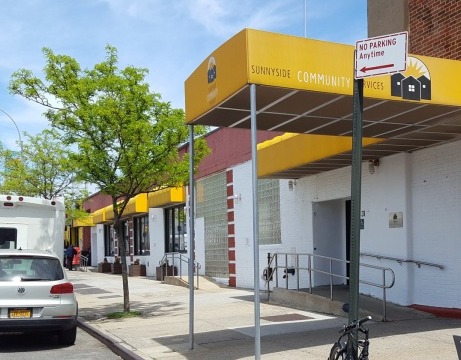
Community Board 2 returned from summer break on Thursday, Sept. 7, at Sunnyside Community Services to discuss New York state’s Open Meetings Law with Allan Swisher, the general counsel and a senior policy advisor for the office of Queens Borough President Donovan Richards. (File photo)
Sept. 8, 2023 By John Schilling
Community Board 2 returned from summer break on Thursday, Sept. 7, at Sunnyside Community Services to discuss New York state’s Open Meetings Law with Allan Swisher, the general counsel and a senior policy advisor for the office of Queens Borough President Donovan Richards.
The law, which applies to all public bodies, makes it mandatory for community boards to meet in person. This requirement, however, ultimately fell victim to the COVID-19 pandemic in 2020, as then-Gov. Andrew Cuomo passed an executive order suspending particular provisions of the law as it related to in-person attendance.
“That was the status quo for about two years,” Swisher said. “The reason why public bodies, including community boards, are now back in person is because of the Open Meetings Law and reverting back to the status quo that existed before COVID hit.”
According to Swisher, the New York state Legislature amended the Open Meetings Law to include a provision allowing public bodies to meet “fully remotely” if an emergency order that prevented people from gathering in public were to come about. Until then, both Gov. Kathy Hochul and Mayor Eric Adams had emergency orders that related to COVID-19 in effect.
“That was the basis by which public bodies, like CB 2, were permitted to meet remotely,” Swisher explained. “That emergency order expired in July, which is why we’re in person now here today.”
Despite the return to in-person meetings, Swisher explained further to CB 2 that while meeting fully remotely is reserved for emergency orders, remote participation in meetings is still possible under “very specific, limited circumstances” with another provision that was added in 2022.
CB 2, along with any other community board, would have to pass a resolution that allows its members to participate remotely under “extraordinary circumstances,” which can include disability, illness, caregiver responsibilities, a tragedy, or something specific that “would prevent people from getting to a meeting.”
“If one of those circumstances applies to a particular member, then that member, if the Board authorizes a resolution, would be permitted to participate remotely over Zoom,” Swisher added.
The catch to this, according to Swisher, is that while a board member could participate remotely in this situation, the board would still need to meet and have a quorum in person with at least 26 members. While remote participants would still be permitted to vote and comment, they would not count for quorum unless they qualify under disability.
“Members who are disabled and unable to attend the meeting because of that disability would count for quorum,” Swisher explained. “There’s a little bit of a wrinkle with that.”
While the Open Meetings Law is clear in this regard, CB 2 members questioned Swisher on how this applies to committee meetings, something Swisher acknowledged as “unclear” although these meetings apply as public bodies under the law.
Other sources of confusion or frustration with the law root from the added responsibility of CB 2 Chairperson Danielle Brecker having to interpret what qualifies as an “extraordinary circumstance” along with not being permitted to ask individuals to disclose their disability, leaving it to an honor system that could be taken advantage of.
To address these concerns, Brecker announced CB 2’s launch of a task force based around compliance with the Open Meetings Law and with three goals in mind.
Led by Second Vice Chair Morry Galonoy, the first goal of the task force is to look into a “resolution” that allows CB 2 to have hybrid meetings both under New York State law and the Board’s bylaws without having to “judge” if a person’s reason for absence is “valid” or not.
“What I have asked [Galonoy] to do is to look at a way to do this that works within the state law but also within our bylaws and also makes a system so that I’m not judging whether you can be out or in because that’s a lot of responsibility that I don’t really want,” Brecker said.
In addition, the task force hopes to clarify the stipulations for committee meetings in a resolution that permits them to be hybrid or fully remote and look for ways to advocate for changes to the Open Meetings Law. According to Swisher, the law’s remote participation provision is set to expire next year and the state legislature will meet to determine what the law will look like from that point forward.
“The goal is not to make this something that is illegal for us to do,” Brecker joked. “The goal is to make it something legal for us to do.”
